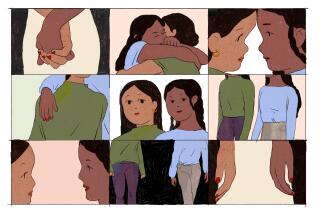Campus Correspondence : The Sad Price of Being Innocently Incorrect
- Share via
SAN LUIS OBISPO — Each morning, Trace and I rode to school together on the bus, leaving behind the conflicts and confines of our lower-middle-class apartments in Fox Hills to invade a foreign land--middle-class Westchester.
We were the outsiders; but our foreigner status helped to bond us and spark the beginning of a friendship.
Trace is an African-American and I a Russian Jew, but these identities never occurred to us at the age of 7; we simply accepted each other, as children tend to do when not taught to hate. We were also drawn to each other by the shared pain of our parents’ divorces; our time together was a salve on our emotional wounds.
Often at lunch, Trace and I talked and joked about what was happening in class or on the playground. Whenever he said something funny, his exaggerated, toothy smile would surface. Sometimes, when I pestered him then laughed, he feigned anger. We never really fought, though.
Trace was superb at playing sports. He was thin and fast. I greatly admired his ability, spirit and determination. “Soco,” which resembles dodge ball, was the game at school, and Trace excelled at it. He was often the sole survivor of his team.
But one day, I innocently exploded the bomb that would destroy our six-year friendship. We were on the bus, he sitting behind me. As usual, we were joking about something. I placed my hands on his round, slightly puffy cheeks and squeezed. I thought the resulting expression was hilarious. “Look, he’s a monkey!” I exclaimed with a laugh. “You look like a monkey, Trace!”
He didn’t flinch. He just let me have my way. When I stopped horsing around, there was a stillness in the air that I didn’t understand. I tried to reassure myself that he really did look like a monkey, but I knew something was wrong.
A few months later, I began to notice that Trace and I weren’t talking much any more. I thought it curious, but didn’t know what to do. One day after the bus had dropped us off near home, I asked him if he was angry at me. He curtly replied, “no.” His response puzzled me. I could understand anger but his attitude was something altogether different. Before I had a better opportunity to talk with him, I moved away.
My “monkey” comments, though innocent, must have struck a raw, racial nerve in Trace. At 12 years old, I had no idea what the word monkey connotes to African-Americans. I was misunderstood and had to face the consequences.
Today, the thought that Trace is no longer a part of my life depresses me. Thirteen years have passed since I last saw him. I wonder what might have happened to our friendship if I had never called him a “monkey” or if we had talked about what I had said.
This year, Trace’s graduation class may hold its 10-year reunion. If it does, I plan to attend, though I had left the school before graduation. I wonder what will happen when we meet again as adults?
More to Read
Sign up for Essential California
The most important California stories and recommendations in your inbox every morning.
You may occasionally receive promotional content from the Los Angeles Times.













